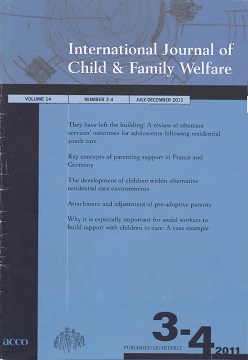The Development of Children Within Alternative Residential Care Environments
Keywords:
child welfare, adoption, foster care, reunification, institutions, orphanagesAbstract
Worldwide, children without permanent parents often enter alternative care arrangements (e.g., adoption, foster care, institutional care, or reunification with the birth family following alternative care), and many advocate placing such children in family-type care arrangements over institutions. The published literature on existing care alternatives suggests that adoptive families provide the best care, foster/guardianship arrangements an intermediate level of care, and biological families of formerly institutionalized children only slightly better care than the institutions. Further, different aspects of children's development (physical growth, attachment and social relationships, the prevalence of problem behaviors, and cognitive outcomes) follow the same sequence, but the quality of care within a category is also associated with children's development. Scientific, practice, and policy implications are discussed with regard to both the preferences of international conventions and cultural values.

